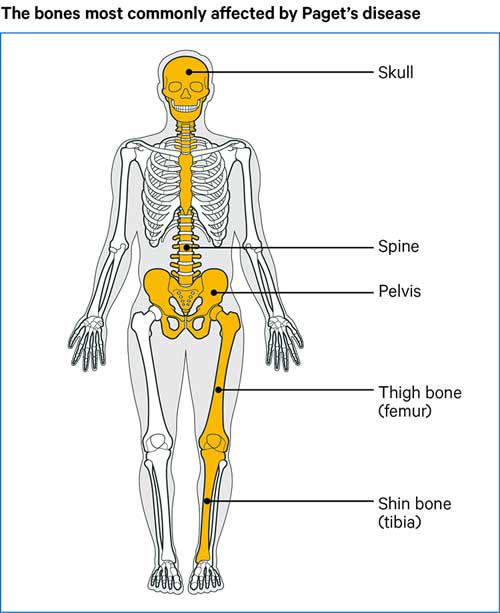What Is Pagets Disease Of Bone?

Pagets Disease of Bone
Never heard of it? I'm not surprised. It doesn't usually affect anyone under 50 after all. As you may deduce, it's a bone disease. It's most prevalent in those of UK and European descent (including those who settled elsewhere like USA or Australia) with those from Scandinavia or Asia being significantly less likely to be affected.
Fun Fact: Pagets disease of bone is one of a couple of conditions, all named after the same person: Sir James Paget (rhymes with gadget), a super-smart surgeon and pathologist who was a dear friend of Charles Darwin.
What is Pagets Disease of Bone?
Bone cells are like any other cell, they break down over time and need to be replaced, this is called bone remodelling. Pagets disease of bone messes up the normal bone remodelling process. Normally the old bone tissue is broken down and new bone tissue replaces it. With Pagets disease more (and larger) bone cells are made more rapidly - because this growth is uncontrolled, the bone made is weirdly shaped and fragile as a result. This fragile, misshaped bone can leave you in pain, more prone to fractures and cause arthritis on the affected joints.
Pagets can affect one bone or a few bones at once, in either a small area or the whole bone (but thankfully doesn't seem to spread to normal bones) and tends to affect the femurs (thigh bone), pelvis, shoulders, skull, spine and tibia (shin bone). Pagets affects older people and is seldom diagnosed in anyone under 50.

Symptoms of Pagets Disease of Bone
Pagets disease of bone has a disturbing tendency to not have symptoms. Many cases are only diagnosed by chance through x-rays and blood tests looking for other things. For those who do have symptoms, they may show one (or more) of the below:
Pain: either from the bone itself or from the way the altered bones put stress on your joints, nerves and movement.
Warmth over the affected bone: larger bone cells need more energy from your blood, where the affected bone sits near the skin (like the shin bone) this can make it feel unusually warm.
Headache and hearing loss: this would indicate Pagets has affected the skull and bone has overgrown.
Tingling, numbness and loss of movement: generally results from nerves trapped by bone overgrowth.
Bone deformity: as the bones weaken, they can bend (especially legs).
Enlarged and misshapen bones can put stress on joints which leaves you at greater risk of arthritis.

Treatment for Pagets Disease Of Bone
There is no cure for Pagets disease of bone (yet!), so treatment is all about managing the condition. The aim of treatment is to relieve pain and prevent progression of the various complications you could develop (like arthritis).
Your doctor may recommend a type of drug called bisphosphonates, these work to regulate the bone renewal and can ease the pain caused by Pagets.
Your doctor may advise you to see a physiotherapist or an occupational therapist if you've been having trouble with your movement as a result of Pagets. As no two cases are identical, so too does the recommended treatment change.
You can help yourself by eating a diet high in calcium and Vitamin D (you may need to start taking supplements in order to get enough). Calcium and Vitamin D both aid in the formation of healthy bone growth.
Foods high in calcium: Dairy (low-fat ones, such as semi and skimmed milk, tend to have more calcium), calcium enriched plant milks, fish that are eaten with bones (like sardines).
Foods high in Vitamin D: Oily fish (salmon, sardines, mackerel, herring), red meat, liver, egg yolks, fortified foods (some fat spreads and breakfast cereals). The best way to get Vitamin D is through skin exposure to sunlight, but this is hard to do in winter.
Side Effects of Pagets Treatment
Many newly diagnosed people are wary of the potential side effects of their medication (understandable). Bisphosphates work by slowing bone renewal. They are fairly well tolerated by the body, which makes the most common side effect is an upset stomach. A single course of treatment can last 3-5 years of daily tablets (or just 1 injection!) and can last you for years afterwards.
Side effects are usually minimal and can include:
Heartburn (tablets only, only happens if you've not taken them correctly)
Sore Mouth (tablets only, happens if you've not taken them correctly)
Flu-like symptoms (more common with intravenous treatment)
Bone pain (more common with intravenous treatment)
Muscle pain
Headaches
Itchy rash
Always report any side effects to your doctor (obviously) and they may change the medication.
Pagets Association
The Pagets Association is the ONLY UK charity to solely focus on Pagets disease of bone, supporting, sufferers, health professionals and research into the potential genetic causes, historical tracking of Pagets and rare complications that can occur.
It was started by one truly remarkable woman, Ann Stansfield, who ran it nearly single-handedly out of her front room for many years due to her husband's diagnosis of Pagets disease and the little information available at the time.
January 11th marks Paget's Awareness Day, a day to raise the profile of this life-changing disease. Pagets may not yet have a cure, but we're working on it.